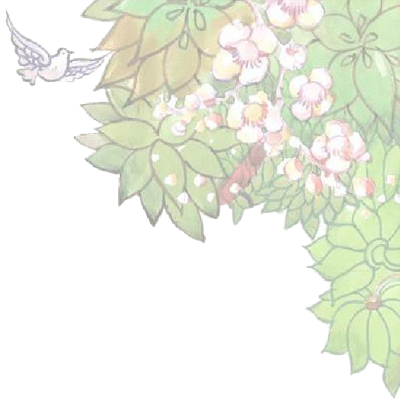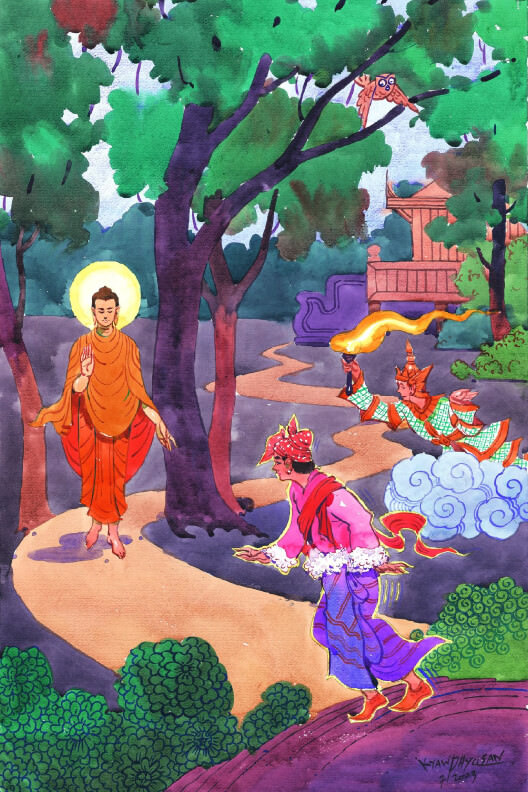33話 アナータピンディカ ・・・・ 給孤独長者

第3部 法輪を転じる~伝道布教へ
第1章 さまざまな男たち
33話 アナータピンディカ ・・・・ 給孤独長者

アナータピンディカの帰依
コーサラ国の首都サーヴァッティ(舎衛城)に、アナータピンディカ(訳注:漢訳は給孤独長者。孤独な貧しい人々に食べ物を気前よく施す資産家という意味の通称。在家の男性信者で布施第一とされる)として知られる富豪が住んでいた。本名はスダッタだが、惜しみなく施し与えるので、そう呼ばれていたのである。
ある折、アナータピンディカはサーヴァッティの品物を五百台の荷車に積んで、マガダ国の首都ラージャガハ(王舎城)へ商いの旅に出かけた。ラージャガハに着くと、いつもなら大喜びで迎えてくれる義弟(妹婿)が、無視するかのような態度に見え、食事の提供の手配と準備に忙しくしていた。そのとき、かれは、こう思った。
「嫁とり(アーヴァーハ)か婿とり(ヴィヴァーハ)をしているのだろうか? それとも、何か大きな供犠か? それとも、あすはビンビサーラ王を招待して、お供の者たちも含めて全員にごちそうするのだろうか?」
富裕な商人である義弟は召使いたちに指示し終えてから、アナータピンディカのもとにやって来て、これまでと変わらぬように大喜びで迎えてくれた。アナータピンディカが先ほど思ったことを義弟に話してみると、義弟は、こう答えた。
「結婚式をするわけでもなく、あすビンビサーラ王を招待して、お供の者たちも含め全員にごちそうするのでもありません。そうではなく、あす世尊であるブッダを上首とする比丘僧団に、四つの資具(衣食住薬)を布施する祭礼の準備をしているのです」
アナータピンディカが「ブッダ」という言葉を耳にしたとき、喜びでいっぱいになった。耳にした言葉が「ブッダ」であったのかどうか自信がもてなかったので、義弟にもう一度確かめた。
「いま、『ブッダ』と、いったのかい?」
「そうです。『ブッダ』と、いいました」と、義弟は答えた。
三回確かめて、三回とも同じ答えであった。アナータピンディカは、こう考えた。
「『ブッダ』という言葉を耳にするのは、ほんとうに珍しい。そして、『ブッダ』がこの世に来られるのは、さらにむずかしいことだ。いま義弟がいったように、世尊はラージャガハ近くの寒林(シータヴァナ)(死体を葬る林)に住まわれている。いますぐ世尊に会いに行ってはどうであろうか?」
しかしながら義弟が、もう夜はふけていて、この時間には行かない方がいい、と忠告してくれた。あすの朝早くに行った方がいい、と勧められたのである。それでアナータピンディカは自分の部屋に行って、こんなふうに考えていた。「あすの朝早く、阿羅漢であり、正自覚者である世尊に、わたしはお目にかかれるであろう」と。
寝台に横になり、ずっと世尊のことを考えつづけた。世尊のもとに訪れたい、という望みがあまりにも強く、もうそろそろ夜明けか、と思って、夜中に三度も起きた。このように、世尊に深く傾倒する感覚がなみはずれて大きくなり、身体から光線を発するほどであった。
夜明け前の朝早くにアナータピンディカは起きて、寒林へ向かった。ラージャガハの街の門に着いたときは、シーヴァカ夜叉(ヤッカ)と呼ばれる守護精霊がすでに開門していた。街の外に出て、アナータピンディカの身体から発していた光線は消え、闇が目の前にあった。恐怖、不安、戦慄(せんりつ)が身体の中から起きた。引き返したかったが、シーヴァカ夜叉がみずからの姿を眼に見えるようにせず、次のように言って、勇気づけてくれた。
「百の象も、百の馬も
ラバに牽かれた戦車も
宝石と耳環(イヤリング)でかざった百千の乙女がいても
これらすべて、一歩前進する十六分の一にも及ばない。
前進せよ、おお、長者よ、前進せよ!
引き返すより、前進するがよい!」
この詩句をきいて、アナータピンディカの恐怖はおさまった。そして世尊に心身とも委ねた信頼がよみがえり、ふたたびそれが強まった。かれの身体はまた光を放ち、闇が消えた。
しかしながら、墓地を通りすぎるとき、多くの死体の臭気と、野犬と野狐(ジャッカル)の吠え声がして、歩きつづける意欲をくじいた。身体から発する光が消え、前のように闇が落ちてきた。しかし、道中ずっと付き添っていたシーヴァカ夜叉が、ふたたび勇気づけてくれた。
またもやアナータピンディカに恐怖、不安、戦慄がわき起こり、これで三度目だったが、シーヴァカ夜叉が危難の克服をすべて助けて、世尊への信頼を回復させてくれたのであった。
とうとう寒林(シータヴァナ)に到着したとき、世尊は起きていて、野外で歩く冥想をされていた。世尊がアナータピンディカを見たとき、歩く冥想からはなれ、席に坐られた。それから世尊は「来たれ、スダッタよ!」と、呼びかけられた。
アナータピンディカは世尊が本名で呼んでくださったのをきいて、うれしかった。世尊に近づき、足もとに礼拝し、おききした。
「尊い方よ、よくお眠りになられましたか?」
世尊は、煩悩すべてを根絶して涅槃に達した聖者は心が平安で、いつでもつねにぐっすり眠れるのだ、とお答えになった。引きつづいて、世尊は次第説法と四聖諦を説かれた。説法の終わりには、アナータピンディカは真理(ダンマ)をさとり、預流(ソーターパンナ)聖者となった。そのとき、仏法僧に帰依することを決めた。世尊と弟子たちを次の日に、食事に招待した。世尊は無言のまま、同意された。
アナータピンディカが義弟に起きたことを話したとき、義弟は、食事の提供の手配をすべてやってあげましょう、と申し出たが、丁重に断った。同じく、市場町の首長、ビンビサーラ王が、それぞれ、世話する、と申し出たが、布施の食事は自分ひとりでやれる、といって、申し出を断った。
次の日、アナータピンディカは手ずから食事の給仕をして、世尊と弟子たちに多くの種類のおいしい食べ物をふるまって接待した。食事後、アナータピンディカは、こんな招待もした。
「尊い方よ、世尊と比丘僧団の方々が、サーヴァッティで雨安居されますように」
世尊は同意して、こういわれた。
「完全者は遠離の場所をよろこびます、長者よ」
アナータピンディカは「わかりました、世尊。承知しました、最勝者さま」と、応じた。それから世尊に礼拝して、右回りしながら去った。
祇園(ジェータヴァナ)精舎の建設
アナータピンディカはラージャガハでの仕事を終えたとき、急いでサーヴァッティに帰った。帰宅途中、世尊が道に沿ってやってくる、と人々に知らせた。かれらに指図して、庭園をつくらせ、住まいを建てさせ、布施の手配をさせた。
サーヴァッティに着くなり、アナータピンディカは、ただちに世尊を上首とする比丘僧団のための精舎の適地を探した。ようやく、ジェータ王子の所有する園林をみつけた。精舎に必要なすべての品格をそなえていた。しかしながら王子に、園林を買いたい、という意図を話したとき、王子は、もし、アナータピンディカが、園林中の隅々まで百千の金貨を敷き詰めないなら、売るのは断る、と言ったのである。アナータピンディカはこの条件で園林を買うことに同意した。しかし王子は、売らない、と言い張った。この争いは裁判に持ち込まれ、そこにおいて仲裁調停の役人が、アナータピンディカに好都合な裁定を下した。
アナータピンディカは金貨を荷車で運び、ジェータ王子の園林をそれで敷いた。しかし最初に運んだ金貨だけでは、園林の全面を敷き詰めるのには足りなかった。門の近くの小さな空地が、敷けないままで残ったのである。アナータピンディカは配下の男たちに、空地に敷けるよう、帰って、もっと金貨を持ってくるように、と命じた。これをきいてジェータ王子は、こう思った。(アナータピンディカは、これほどまで莫大な金貨をつかっているのだ。たしかに、これは特別な、高貴な慈善行為にちがいない)と。そこでアナータピンディカに、こう告げた。
「もう十分だ、長者よ、十分だ! あの空地に、金貨を敷くな! わたしにそこを残して、精舎入り口にアーチ付き通路を造らせてくれ!」
アナータピンディカは「このジェータ王子はとびぬけて有名な人だ。このように有名な人が万一、世尊の教えに確信を得るとしたら、大きな利益をもたらすことになるだろう」と考えた。そこで、その空地はジェータ王子のために残すことにした。
かくしてジェータ王子の園林は、十八クロール(一億八千万)の金貨でアナータピンディカが買った。また別の十八クロールの金貨で、壮麗な精舎を建てた。さらにまた別の十八クロールの金貨は、九か月間の僧院落慶法要につかった。かくして祇園精舎は合計五十四クロール(五億四千万)の金貨をつかって建設されたのである。
世尊はこの祇園精舎で十四回目の雨安居を過ごされた。さらにまた二十一回目から四十四回目までの雨安居はサーヴァッティで過ごされ、そのうち十八回は祇園精舎で、そして、残る六回はヴィサーカー信女が寄進した東園鹿子母講堂で、過ごされた。
参拝対象・・・聖地の三つのタイプ
世尊がサーヴァッティに滞在されるたびに、アナータピンディカは世尊のもとを訪れた。世尊が伝道布教の旅でサーヴァッティからはなれているときは、アナータピンディカは、直接ふれられる参拝の対象がなくて、さびしく感じた。このため、ある日、アーナンダ尊者に、聖地を建設したい、という願いを告げた。アーナンダ尊者が世尊にお尋ねすると、世尊は、三つのタイプの聖地がある、と言われた。第一は、舎利(サーリーリカ)聖地だ。身体関連の対象を納める聖地で、すなわち世尊の般涅槃の後、身体の遺物(訳注:骨、歯、髪など)を聖廟に納める。第二は、遺品(パリボーギカ)聖地。私的に使われた遺品を参拝対象とする。すなわち世尊みずからが使われた托鉢の鉢や、衣、そして菩提樹などである。そして最後は指示(ウッデーシカ)聖地で、世尊をしのばせるものを尊崇対象とする。すなわちブッダの画像(仏像・仏画)など眼に見える象徴である。世尊はまた、三種類の聖地の中に、菩提(ボーディ)樹についても語られた。その樹下で菩薩(ボーディサッタ)はさとりに達したのだ。世尊がまだ生きているあいだと、亡くなった後の両方で、世尊を思い起こす記念物としての菩提樹である。
したがって、菩提樹を祇園精舎に植えてもよい、という世尊の許しを得て、アーナンダ尊者はモッガラーナ尊者に、元の菩提樹から実をもってきてもらうよう頼んだ。神通第一のモッガラーナ尊者は、ただちに樹から落ちてきた実を一つ取ってきて、アーナンダ尊者に手渡した。そこでアーナンダ尊者は、パセーナディ王に記念植樹するようにと、それを提供した。しかし王は、王侯にふさわしい謙虚さで、今世では王としての務めという一人の世話役としてのみ奉仕する、と答えたのである。その実を神聖に植樹するには、世尊の教えに、より密接な関係をもつ誰かがはるかにふさわしいであろう。王とともにアーナンダ尊者は、その実をアナータピンディカに手渡した。そこで、アナータピンディカが祇園精舎の入り口付近の場所に植えた。後に菩提樹は成長し、すべての敬虔な信者たちの尊崇の対象となっている。
アナータピンディカの家族たち
アナータピンディカはプンニャラッカナーという名の女性と結婚した。ラージャガハの裕福な商人の妹である。プンニャラッカナーはたいへん貞淑な女性で、「福徳(プンニャ)の特相(ラッカナー)をもつ女」という意味の、その名に恥じない生き方をした。一家に、よき家風をもたらしたのである。使用人の面倒をよくみて、托鉢にくる比丘たちにも気を配った。アナータピンディカはつねに五百人の比丘のために、毎日、托鉢の食べ物を提供した。それに加えて、病気の比丘やそのお世話をしている比丘、旅に出ようとしている比丘、サーヴァッティに着いたばかりの比丘、来客、貧しい人々、障碍者・虚弱者らにも托鉢の食べ物を用意した。そして不意の来客にも間にあうように、座椅子五百が自宅にあった。
アナータピンディカには娘三人と息子一人のこどもがいた。三人娘の上のふたりはマハー(大)スバッダーとチューラ(小)スバッダーである。父親同様、敬虔な信者で預流聖者に達していた。一方、末娘スマナーは深い智慧において家族でも抜きん出ていた。ブッダから説法を一つ聴くなり、さとりの第二の階梯である一来(サカダーガーミ)果に達した。
アナータピンディカのたった一人の息子カーラは当初、法(ダンマ)についてまったく知りたいと思わず、商売一本槍の仕事漬けであった。ある日、アナータピンディカが、もし休息日に休むなら一千金をやろう、といってみた。カーラは父の申し出に同意して、丸一日仕事を休み、家族といっしょに過ごした。アナータピンディカは、もしカーラが精舎に行って世尊の説かれる一節を暗記したら、別に一千金やろう、といった。カーラは一つの偈を学ぶたび、世尊の真意がわからず、それでひどく集中して、くりかえし聴かねばならなかった。その意味を理解しようと格闘しているあいだに、突然、世尊の教えに深く鼓舞され、預流果に達したのである。かくて、父の巧みなみちびきによって、カーラは敬虔な信者の息子となり、教団への大後援者のひとりとなった。
「七妻女」・・・悪妻、良妻、妻の七つのタイプ
カーラは名の知られた在家篤信者ヴィサーカーの姉妹の一人、スジャーターと結婚した。ある日、アナータピンディカの家で托鉢の食事後、世尊が説法されていると、大きな叫び声、わめき声が別の部屋からきこえてきた。世尊は説法をやめ、アナータピンディカに騒ぎの理由を尋ねた。まるで漁師たちが叫んでいるかのようであったからである。アナータピンディカが答えた。
「尊い方よ、あれはスジャーターでございます。わが義理の娘、すなわち息子の嫁で、いっしょに住んでいます。そのスジャーターが使用人を叱っております。裕福な家から嫁いできて、家柄をとても誇りにしています。誰でもぞんざいに扱い、使用人をたたき、その行くところはどこでも、恐れ、おののきが広がります。夫の両親にも夫にも気くばりをまるでしません。托鉢には布施せず、信心も信仰もなく、いつでもずっと争っております。尊師を崇(あが)めず、敬わず、尊びません」
そこで世尊は、彼女を呼ぶようにもとめた。世尊のもとに来ると、世尊がきかれた。
「スジャーターよ、そなたは『七妻女』のどれになりたいのか?」
「尊い方よ、世尊のお尋ねの意味がわかりません。その『七妻女』とは何でしょうか?」
そこで世尊が、このように説明された。
「スジャーターよ、心が邪で、無慈悲、夫以外の男たちを好み、夫をないがしろにし、娼婦で、夫を悩ませると心に決めている-そんな妻は『人殺しのような妻(ヴァダカバリヤー)』と呼ばれます」
「夫が自分の手先の技術や、商い、農作業で稼いだとき、その中からいくらかくすね、へそくってわが物にする。そんな妻は『泥棒のような妻(チョーラバリヤー)』と呼ばれます」
「ものぐさで大食らい、いっさい何もしないと決め込んで、がさつで、あこぎ、口の利き方はぶっきらぼう、勤勉によく働く者には居丈高で尊大-そんな妻は『暴君のような妻(アイヤバリヤー)』と呼ばれます」
「いつも助けてあげて、親切、夫をたったひとりの息子のように守り、夫が稼いでたまった財産を大切にする。そんな妻は『母のような妻(マートゥバリヤー)』と呼ばれます」
「夫を深く尊敬し、妹が年上の兄や姉に対するようにふるまい、夫の願いには従順である。そんな妻は『妹のような妻(バギニバリヤー)』と呼ばれます」
「夫を見るとうれしがり、友だちを歓迎するように、ひたむきで、貞節、献身的である。そんな妻は『友だちのような妻(サキーバリヤー)』と呼ばれます」
「怒りがなく、もの静か、夫のすることすべてを我慢し、心情は清らか、憎しみがなく、夫の願いには従順である。そんな妻は『召使いのような妻(ダーシバリヤー)』と呼ばれます」
「人殺しや泥棒、暴君のようなタイプの妻はだめで、不都合です。こうした種類の妻たちは、身体がこわれたら地獄に再生します。しかし母や妹、友だち、召使いのような妻はよくて、賞賛に値します。こうした種類の妻たちは、道徳的にしっかりしていて節度があります。身体がこわれたら天界に行きます」
「これらが、スジャーターよ、男が妻とするかもしれない『七妻女』です。そなたは、どれですか?」
スジャーターは世尊の言葉に深く胸をうたれ、こう答えた。
「尊い方よ、世尊はわたしを、きょうからは『召使いのような妻(ダーシバリヤー)』として、ご承知くださいますように」
かくてスジャーターは悪い態度を改め、夫に対して良妻であるよう懸命に努めた。後に彼女は世尊の忠実な弟子となり、世尊に救われたことをずっと感謝したのである。
アナータピンディカへの説法
世尊が祇園精舎に住まわれたときはいつでも、アナータピンディカは定期的に日に二回、世尊にお目にかかるためにやってきた。ときには友人多数といっしょで、つねに若い沙弥(新参の見習い僧)たちに托鉢食を与えた。しかしながら、世尊がお疲れになってはいけない、と心配して、質問を一切しなかった。けれども世尊は、みずからの意思でアナータピンディカにさまざまな説法をされ、そのうちのいくつかが増支部経典にある。
あるとき、世尊は「得業経(パッタカンマ スッタ)」(増支部・四集・得業の章1)をアナータピンディカに説かれた。
「長者よ、これら次の四つの状態は実現が望ましく、大切で、とてもうれしく、そして世間で得がたいものです。その四つとは何か? こんな願いです。『合法的な手段で富がわたしのもとに来ますように!』、『親族と先生のあいだに、わたしのよい評判がありますように!』、『長生きできて、たいへんな高齢まで生きられますように!』、『身体がこわれて、死んだ後、天界に再生できますように!』」
「さて長者よ、これら四つの状態を勝ち得るには、四つの状態への助けとなるものが四つあります。その四つとは何か? 信の完成(サッダサンパダー)(信具足)、戒の完成(シーラサンパダー)(戒具足)、施の完成(チャーガサンパダー)(施具足)、慧の完成(パンニャーサンパダー)(慧具足)です」
また別の機会に、世尊は「無債経(アーナニャ スッタ)」(増支部・四集・得業の章2)をアナータピンディカに説かれた。
「長者よ、これら次の四種類のこの上ない喜びは、在家者によって勝ち取るべきものです。所有の楽(アッティスカ)、受用の楽(ボーガスカ)、無債の楽(アーナニャスカ)、無罪の楽(アナヴァッジャスカ)です」
「所有の楽とは何か? ここに、長者よ、良家の若い男がいて、精力的にがんばって富を得たとします。かれの腕力で富をかき集め、額に汗して富を勝ち得て、公正に合法的なやり方で得たものです。そこで、こう思いつく。『富はわたしのものだ。精力的にがんばって得た。合法的に得た』と。この上ない喜び、満足が、かれにやってきます。これは、長者よ、所有の楽、と呼ばれます」
「受用の楽とは何か? ここに、長者よ、良家の若い男がいて、精力的にがんばって得た富で、その富を使って楽しむのと、功徳ある行為をするのと、両方やるとします。そこでこう思いつく。『精力的にがんばって得た富で、その富を使うのと、功徳ある行為をするのと、両方わたしは楽しんでいる』と。この上ない喜び、満足が、かれにやってきます。これは、長者よ、受用の楽、と呼ばれます」
「無債の楽とは何か? ここに、長者よ、良家の若い男がいて、その大小を問わず負債がない、とします。そこでこう思いつく。『わたしには大小を問わず誰にも負債がない』と。この上ない喜び、満足が、かれにやってきます。これは、長者よ、無債の楽、と呼ばれます」
「無罪の楽とは何か? ここに、長者よ、高貴な弟子が、身体の過ちなき行為、言葉の過ちなき行為、思考の過ちなき行為に恵まれている、とします。そこでこう思いつく。『わたしは身体の過ちなき行為、言葉の過ちなき行為、思考の過ちなき行為に恵まれている』と。この上ない喜び、満足が、かれにやってきます。これは、長者よ、無罪の楽、と呼ばれます」
これらが在家者によって勝ち取るべき四種類のこの上ない喜びです。
アナータピンディカの死
アナータピンディカは死の直前、まさに亡くなろうとしていたとき、従者に世尊のもとへ代わりに行って、世尊の足もとに礼拝し、アナータピンディカが重病である、とお知らせするように、と頼んだ。そしてまたサーリプッタ尊者に、恐れ入りますが、お慈悲によって家まで来てくださいますように、と懇願してくれ、とも頼んだのである。
そこでサーリプッタ尊者はアーナンダ尊者をともない、床に臥しているアナータピンディカを訪問した。サーリプッタ尊者はアナータピンディカを慰め、「アナータピンディカ教誡経」(中部143)と呼ばれる法話を説いた。
この法話の終わりには、アナータピンディカの両眼から涙がこぼれ落ちた。アーナンダ尊者は、あわれみ深くアナータピンディカの方に向いて、気持ちが落ちこんでいるのですか、と尋ねた。ところが、アナータピンディカは「おお、アーナンダ尊者さま、わたしは落ちこんでいるのではありません。わたしは尊師とお弟子たちに長いあいだお仕えしましたが、それでも、あれほどの深遠な法話を聴いたことがありませんでした」と答えたのである。
そうするとサーリプッタ尊者が「あのような深遠な法話は、長者よ、白衣の在家者には明解ではないでしょう。かれらには理解できないでしょう。しかし、修行の進んだ弟子たちには十分に明解なのです」と、応じた。
アナータピンディカは「サーリプッタ尊者さま、あのような真理(ダンマ)についての法話を、白衣の在家者にもしてください。眼にちょっとしたごみがついているだけの者たちがおります。もし、かれらがそうした教えを聴かなかったら、かれらは滅びます。幾人かは理解できるでありましょう」と願ったのである。
それから、サーリプッタ尊者とアーナンダ尊者が去って行き、ほどなくアナータピンディカは亡くなった。そしてただちに兜率(トゥシタ)天(訳注:とそつてん。六欲天の第四で、七宝でできた宮殿がある。ブッダはここから降下してマハーマーヤー妃の胎内に宿って生誕したとされている)に生まれ変わったのであった。
アナータピンディカは心底からひたむきに仏法僧に傾倒していたので、天の神に生まれ変わったその日の夜、祇園精舎にひとりの若い神としてあらわれ、天の光であたりをくまなく照らした。世尊のもとに近づき、礼拝後、サーリプッタ尊者の徳を褒めたたえる偈を口にして、精舎に住まわれている世尊と弟子たちにお目にかかった喜びを表現した。
このジェータの園林(祇園)こそ、
見者たち(比丘僧団)の住むところ、
法の王(ブッダ)が住みたまい、
わたしに喜びをあたえるところ
行為と智慧と正義によって、
徳と一つの最上の命によって、
これによって、人びとは清まる。
生まれの姓にもよらず、富にもよらずに
それゆえ、賢明なる者は
自己の利益をよく見ることから、
入念に法を吟味せよ。
かくて、かれはそこにて清まる
サーリプッタこそまさしく、智慧と、
徳と、心の内なる安らぎを授かっている。
誰であれ比丘が彼岸に趣くならば、
最上にてやっとサーリプッタと同等になれよう
このように偈を唱え、天の神アナータピンディカは、世尊に礼拝し、右回りしながら、たちまちのうちに消え去ったのであった。
※ 画像やテキストの無断使用はご遠慮ください。/ All rights reserved.

Episode 33 Anāthapiṇḍika, THE FEEDER OF THE POOR
The Conversion of Anāthapiṇḍika
In Sāvatthi, there lived a millionaire known as Anāthapiṇḍika, the Feeder of the Poor. He was so called because of his munificence. His personal name was Sudatta. On one occasion, Anāthapiṇḍika travelled to Rājagaha on a business trip with five hundred carts loaded with goods from Sāvatthi. On his arrival at Rājagaha, he noticed that his brother-in-law, who used to welcome him enthusiastically, seemed to be
neglecting him and was busily engaged with arranging and preparing food offerings. Then, he thought: “Is there a taking in marriage (āvāha) or a giving in marriage (vivāha)? Or is there some great sacrifice? Or has he invited King Bimbisāra and his full retinues to a feast tomorrow?”
When the rich merchant had finished directing his servants, he went to Anāthapiṇḍika and welcomed him enthusiastically as ever before. When Anāthapiṇḍika told him his thought, he replied: “I am not holding a marriage ceremony, nor have I invited King Bimbisāra and his full retinues to a feast tomorrow. But I am preparing a great offering ceremony of four requisites to the Order of Bhikkhus headed by the Buddha, the Enlightened One, for tomorrow.”
When Anāthapiṇḍika heard the word “Buddha”, his body was suffused with rapture (pīti). He was not sure if he had heard the word “Buddha”, so he asked his brother-in-law again: “Did you say the ‘Buddha’?”
“Yes, I said the ‘Buddha’,” his brother-in-law replied.
Three times he asked, three times he got the same answer. He thought:
“It was rare indeed to hear the word ‘Buddha’, and it is hard indeed that the ‘Buddha’ come in the world. Now, as was told by his brother-in-law, the Blessed One was dwelling in the Cool Grove (Sītavana) near Rājagaha. Suppose I go there to see the Blessed One now?”
However, the rich merchant of Rājagaha advised him not to go at that time as it has been late in the evening. He suggested Anāthapiṇḍika to go early tomorrow morning.
Then, Anāthapiṇḍika went to his room with a thought: “Early tomorrow morning, I shall be able to see a Blessed One, a Worthy One and a Fully-Enlightened One.” He laid down on his bed thinking of the Blessed One all the time. His desire to visit the Blessed One was so intense that he got up three times in the night thinking it was dawn. Even so, his sense of deep devotion towards the Blessed One became so
exceedingly great that rays emitted from his body.
In that early morning before dawn, Anāthapiṇḍika arose and went to the Cool Grove. When he reached the city gate, it was already opened by a guardian spirit, called Yakkha Sīvaka. As soon as he was out of the city, the rays emitting from his body disappeared, and darkness was before him. Fear, dread, and horror arose in him. He wanted to turn back, but Yakkha Sīvaka encouraged him without making himself
visible, saying:
“A hundred elephants and a hundred horses, too.
A hundred chariots drawn by she-mules.
A hundred thousand maidens decked with gems and earrings.
All these are not even worth a sixteenth part of single step forward.
Go forward, O householder, go forward!
Better go forward than turn back!”
Having heard this stanza, his fear subsided, and his devotional faith in the Blessed One arose and strengthened again. His body was glowing again, and the darkness disappeared.
Nevertheless, when he passed through a cemetery, the smell of dead bodies and the voices of dogs and jackals discouraged him from continuing his journey. The light from his body vanished, and darkness fell as before. But, Yakkha Sīvaka, who accompanied him along the way, encouraged him again.
This fear, dread, and horror happened to him again for the third time, but Yakkha Sīvaka helped him to overcome all the dangers and revived his faith in the Blessed One.
Finally, when he arrived at the Sītavana Grove, the Blessed One had arisen and was pacing up and down in the open air. When the Blessed One saw Anāthapiṇḍika, He left His walk and took a seat. Then, He addressed him: “Come, Sudatta!”
Anāthapiṇḍika was happy to hear the Blessed One calling his personal name. He approached the Blessed One, paid obeisance at His feet and asked: “Lord, did You sleep well?”
The Blessed One replied that a brahmin who had eradicated all defilements and had attained Nibbāna would be peaceful in his mind; thus he could always sleep well at all times. Subsequently, He preached the progressive discourse and the Four Noble Truths. At the end of the discourse, Anāthapiṇḍika realised the Dhamma and became a Sotāpanna. Then, he resolved to take the Buddha, the Dhamma, and the Saṁgha for refuge. He invited the Blessed One and His Disciples to partake of a meal on the following day. The Blessed One gave His consent in silence.
When he related to his brother-in-law what had happened, his brother-in-law offered himself to arrange all things for Anāthapiṇḍika, but Anāthapiṇḍika refused it politely. Likewise, when the chief of the market town and King Bimbisāra offered their service, he declined the offer saying that he would be able to manage the
alms-giving by himself. The following day, Anāthapiṇḍika served the meal with his own hands and attended upon the Blessed One and His Disciples with many kinds of good food. After the meal, Anāthapiṇḍika invited: “Lord, may the Blessed One and the Order of Bhikkhus spend the rains-residence in Sāvatthi.”
The Blessed One gave His consent saying: “The Perfect One delights in secluded places, householder.”
Anāthapiṇḍika replied: “I understand, the Blessed One; I understand, the Sublime One.” Then, he paid homage to the Blessed One and left, keeping Him on his right.
The Construction of the Jetavana Monastery
When Anāthapiṇḍika had finished his business at Rājagaha, he quickly returned to Sāvatthi. On his way home, he informed people that the Blessed One would pass by the road. He directed them to make gardens, build dwellings, and arrange for alms-giving.
On his arrival at Sāvatthi, Anāthapiṇḍika immediately looked for a suitable place to be prepared as a monastery for the Order of Bhikkhus headed by Blessed One. Finally, he found a park belonging to Prince Jeta. It has all the requisite qualities. However, when he told the prince of his intention to buy the park, Prince Jeta refused to sell it unless Anāthapiṇḍika covered the park with a hundred thousand gold coins from edge to edge. Anāthapiṇḍika agreed to buy the park on this condition. However, the prince persisted not to sell it. The case was brought to court for trial, and there, the arbitrating officer decided in favour of Anāthapiṇḍika.
Anāthapiṇḍika had the gold coins brought in carts, and he had the Jeta’s park covered with them. But the gold coins, which were brought the first time, was not enough to cover all sides of the park; there was small space near the gate that remained uncovered. Anāthapiṇḍika ordered his men to go back and fetch more gold coins to cover the space. Hearing this, Prince Jeta thought: “Anāthapiṇḍika is spending such an immense number of gold coins. Surely this must be an
extraordinary and noble act of charity.” Then, he told Anāthapiṇḍika: “Enough, householder, enough! Do not cover that space! Leave it for me to build an archway for the monastery!”
Anāthapiṇḍika thought: “This Prince Jeta is a prominent and well-known person. It will be greatly beneficial if such a well-known person were to acquire confidence in the Teachings of the Blessed One.” So, he left that space for Prince Jeta.
Thus, Prince Jeta’s park was bought by Anāthapiṇḍika at a cost of eighteen crores of gold coins. He constructed a magnificent monastery on it worth another eighteen crores of gold coins. And another eighteen crores were spent for the nine-month inaugural ceremony. Thus, the Jetavana Monastery was built with a total expense of fifty-four crores of gold coins.
The Blessed One spent His fourteenth rains-residence in the monastery. He spent the twenty-first up to the forty-fourth rains-residence in Sāvatthi—that is, eighteen times in the Jetavana Monastery, and six times in the Pubbārāma Monastery, which was donated by Visākhā.
The Object of Reverence
Every time the Blessed One stayed in Sāvatthi, Anāthapiṇḍika visited Him. At other times, when the Blessed One was on His missionary journeys away from Sāvatthi, Anāthapiṇḍika felt bereft without a tangible object of reverence. Due to this, one day he told the Venerable Ānanda of his wish to build a shrine. The Venerable Ānanda asked for the Blessed One’s advice, and the Blessed One said that
there were three types of shrines. Firstly, sārīrika, objects of reverence appertaining to the body, i.e. the corporeal relics of the Blessed One after His Parinibbāna. Secondly, pāribhogika, objects of reverence appertaining to personal use, i.e. objects which had a connection with the Blessed One and had been used by Him, such as the
alms-bowl, robes, and the Bodhi tree. And finally, uddesika, objects of reverence pertaining to the representations of the Blessed One, i.e. visible symbols, such as the Buddha image. The Blessed One also said that among the three kinds of shrines, the Bodhi tree, under which the Bodhisatta had attained Enlightenment, was a memorial to the Blessed One, both while He was still alive and after He passed away.
Accordingly, having obtained the permission from the Blessed One to plant this tree in Jetavana, the Venerable Ānanda requested the Venerable Moggallāna to fetch a fruit from the original Bodhi tree. The Venerable Moggallāna immediately took a fruit that was falling from the tree and gave it to the Venerable Ānanda. Then the Venerable Ānanda presented it to King Pasenadi for a ceremonial planting. But the king replied, with princely humility, that he served in this life merely as a steward for the office of the king. It would be far more appropriate for someone with a closer relationship to the Teaching to consecrate the fruit. With his, he handed it to Anāthapiṇḍika. Then, Anāthapiṇḍika planted it at the entrance of the Jetavana Monastery. The tree grew. Later, it became an object of veneration for all the pious laity.
Anāthapiṇḍika’s Family
Anāthapiṇḍika was married to a lady named Puññalakkhaṇā, sister of a rich merchant in Rājagaha. Puññalakkhaṇā was a very virtuous lady who lived up to her name, which means “one with the mark of merit.” She gave a good spirit to the house. She also took care of the servants and the bhikkhus who came at her house for alms. Anāthapiṇḍika always offered alms-food for five hundred bhikkhus everyday. Besides, he also prepared alms-food for sick bhikkhus, bhikkhus who attended to sick bhikkhus, bhikkhus who were about to go on a journey, bhikkhus who just arrived in Sāvatthi, guests, poor people, invalids, etc. And there were also five hundred seats ready in his house for guests who might come at any time.
Anāthapiṇḍika had three daughters and one son. Two of the daughters, Mahā Subhaddā and Cūḷa Subhaddā, were pious like their father and had attained the sainthood stage of Sotāpatti, while the youngest daughter, Sumanā, surpassed even the rest of her family in her deep wisdom. Upon hearing a discourse from the Buddha, she attained the second Fruition of noblehood, becoming a Sakadāgāmi.
At first, the only son of Anāthapiṇḍika, Kāḷa, did not want to know anything of the Dhamma but immersed himself completely in his business affairs. One day, Anāthapiṇḍika said to him that he would offer him one thousand pieces of gold if he were to observe a Sabbath day. Kāḷa consented to his father’s proposal and took one day off from his business and enjoyed himself with his family. Anāthapiṇḍika would give him another thousand if he were to go to the monastery and learn by
heart a stanza preached by the Blessed One. Each time Kāḷa learned a verse, the Blessed One made him misunderstand it, so that he had to listen repeatedly with keen attention. While struggling to comprehend the meaning, suddenly he became profoundly inspired by the Teaching and attained the Fruition of Sotāpatti. Thus, due to the skilfulness of his father, Kāḷa became a devout son and a major benefactor of the Order.
The Seven Kinds of Wives
Kāḷa was married to Sujātā, a sister of the famous lay devotee, Visākhā. One day, after an alms meal in Anāthapiṇḍika’s house, the Blessed One was delivering a discourse when loud shouts and yelling were heard from another room. The Blessed One halted His talk and asked Anāthapiṇḍika the reason for this commotion, which sounded like noisy shouts of fisherfolk.
Anāthapiṇḍika replied: “Lord, it is Sujātā, my daughter-in-law, who lives with us. She is scolding the servants. She came from a wealthy family and she is very proud of her family background. She treats everyone harshly, beats her servants, and spreads fear and terror wherever she goes. She pays no heed to her parents-in-law or to her husband. She does not give alms, was faithless and unbelieving, and was forever causing conflict. She does not venerate, honour, or respect the Exalted One.”
Then, the Blessed One asked that she be called. When she came to Him, the Blessed One asked her: “Sujātā, which of the seven kinds of wives do you want to be?”
Sujātā replied: “Lord, I do not understand the meaning of Your question. What are those seven kinds of wives?”
Then the Blessed One explained: “Sujātā, whosoever is wicked in mind, pitiless, fond of other men, neglecting her husband, a prostitute, bent on harassing, such a wife is called a slayer wife (vadhakabhariyā).”
“When her husband acquires wealth by his craft, trade or farm work, she tries to filch a little for herself. Such a wife is called a thievish wife (corabhariyā).”
“The slothful glutton, bent on doing nothing, harsh, cruel, rough in speech, lives by domineering the industrious; such a wife is called a tyrannical wife (ayyabhariyā).”
“She who is always helpful and kind, who guards her husband as a mother for her only son, who carefully protects the accumulated wealth he earns; such a wife is called a motherly wife (mātubhariyā).”
“She who holds her husband in high regard, as a younger sister holds the elder born, who is obedient to her husband’s wishes; such a wife is called a sisterly wife (bhaginibhariyā).”
“She who rejoices at her husband’s sight, as one friend might welcome another, who is well-raised, virtuous, devoted; such a wife is called a friendly wife (sakhībhariyā).”
“She who is without anger but calm, endures all things of her husband, pure in heart, free of hatred, who is obedient to her husband’s wishes; such a wife is called a handmaid wife (dāsibhariyā).”
“The types of wives like a slayer, a thief, and a tyrant are bad and blameworthy. These kinds of wives, at the breakup of the body, will be reborn in hell. But wives like a mother, a sister, a friend, and a handmaid are good and praiseworthy. These kinds of wives, being steady in virtue and restrained, at the breakup of the body, will go to
heaven.”
“These, Sujātā, are the seven kinds of wives a man may have. Which of them are you?”
Sujātā was deeply moved by the Blessed One’s words. She replied: “Lord, let the Blessed One know me as a handmaid wife from today onwards.” Thus, she changed her bad attitude and strived to be a good house-wife to her husband. Later, she became a faithful disciple of the Blessed One, to whom she was ever grateful for her salvation.
Discourses to Anāthapiṇḍika
Whenever the Blessed One was residing in the Jetavana Monastery, Anāthapiṇḍika regularly went to see Him twice a day—sometimes with many friends—always giving alms to the young novices. However, worried he might make the Blessed One tired, he never asked Him any questions. But, the Blessed One, of His own accord, preached to him various discourses, several of which are contained in the Aṅguttara Nikāya.
Once, the Blessed One was preaching the Pattakamma Sutta to Anāthapiṇḍika:
“Householder, there are these four conditions to realise which are desirable, dear, delightful, and hard to win in the world. What four? The wish: ‘May wealth by lawful means come to me!’ ‘May I have a good report among my kinsmen and teachers!’ ‘May I live long and reach a great age!’ ‘When the body breaks up, after death, may I be reborn in a heavenly world!’”
“Now, householder, to the winning of these four conditions, four conditions conduce. What four? Perfection of faith (saddhasampadā), perfection of virtue (sīlasampadā), perfection of generosity (cāgasampadā), and perfection of wisdom (paññāsampadā).”
On another occasion, the Blessed One preached him the Ānaṇya Sutta:
“Householder, there are these four kinds of bliss to be won by the householder: the bliss of ownership (atthisukha), the bliss of wealth (bhogasukha), the bliss of debtlessness (ānaṇyasukha), and the bliss of blamelessness (anavajjasukha).”
“What is the bliss of ownership? Herein, householder, a young man of a good family has wealth acquired by energetic striving, gathered by the strength of his arms, won by the sweat of his brows, justly obtained in a lawful way. At the thought: ‘Wealth is mine, acquired by energetic striving, …lawfully obtained,’ bliss comes to him, satisfaction comes to him. This, householder, is called the bliss of ownership.”
“What is the bliss of wealth? Herein, householder, a young man of a good family by means of wealth acquired by energetic striving, …both enjoys his wealth and does meritorious deeds. At the thought: ‘By means of wealth acquired…I both enjoy my wealth and do meritorious deeds,’ bliss comes to him, satisfaction comes to him. This, householder, is called the bliss of wealth.”
“What is the bliss of debtlessness? Herein, householder, a young man of a good family owes no debt, great or small, to anyone. At the thought: ‘I owe no debt, great or small, to anyone,’ bliss comes to him, satisfaction comes to him. This, householder, is called the bliss of debtlessness.”
“What is the bliss of blamelessness? Herein, householder, the noble disciple is blessed with blameless action of the body, blameless action of speech, blameless action of mind. At the thought: ‘I am blessed with blameless action of the body, speech, mind,’ bliss comes to him, satisfaction comes to him. This, householder, is called the bliss of blamelessness.”
These are the four kinds of bliss to be won by the householder.
The Death of Anāthapiṇḍika
When Anāthapiṇḍika was about to pass away, he asked his attendant to go to the Blessed One on his behalf to pay homage at His feet, to inform Him that he was seriously ill, and also to humbly request the Venerable Sāriputta, out of compassion, to come to his house. The Venerable Sāriputta, accompanied by the Venerable Ānanda, then visited Anāthapiṇḍika, who was lying on his bed. The Venerable Sāriputta consoled and preached to him a profound discourse called the Anāthapiṇḍikovāda Sutta.
At the end of the discourse, tears came to Anāthapiṇḍika’s eyes. The Venerable Ānanda turned to him compassionately and asked if he were sinking. But, Anāthapiṇḍika replied: “O Venerable Ānanda, I am not sinking. I have served the Master and His disciples for a long time, yet I have never heard such a profound discourse.”
Then the Venerable Sāriputta replied: “Such profound talk, householder, will not be clear enough for white-clad lay followers; they will not understand its meaning; but it is clear enough for advanced disciples.”
Anāthapiṇḍika requested: “Venerable Sāriputta, let such talks on the Dhamma be given to white-clad lay followers, too. There are those with just a little dust on their eyes. If they do not hear such teachings, they will be lost. Some may be able to understand.”
Then, not long after the departure of the Venerable Sāriputta and the Venerable Ānanda, Anāthapiṇḍika passed away and was immediately reborn in the Tusita Heaven.
Anāthapiṇḍika was so genuinely devoted to the Buddha, Dhamma, and Saṁgha that at that very night he appeared in the Jetavana monastery as a young deva, filling the whole area with heavenly light. He went to the Blessed One and, after paying homage to Him, uttered the following verses in extolling the virtues of Venerable Sāriputta, expressed his pleasure on seeing the Blessed One and His disciples residing in his
monastery:
”This indeed is that Jeta’s Grove,
The resort of the Order of seers,
Dwelt in by the Dhamma King,
A place that gives joy to me.”
”By action and knowledge and righteousness,
By virtue and an excellent life:
By this are mortals purified,
Not by clan or by wealth.”
”Therefore a person who is wise,
Out of regard for his own good,
Should carefully examine the Dhamma:
Thus he is purified therein.”
“Sāriputta truly is endowed with wisdom,
With virtue and with inner peace.
Even a bhikkhu who has gone beyond
At best can only equal him.”
Having spoken thus, the deva paid homage to the Blessed One and, keeping Him on the right, disappeared right there.
※ 画像やテキストの無断使用はご遠慮ください。/ All rights reserved.
アシン・クサラダンマ長老
1966年11月21日、インドネシア中部のジャワ州テマングン生まれ。中国系インドネシア人。テマングンは近くに3000メートル級の山々が聳え、山々に囲まれた小さな町。世界遺産のボロブドゥール寺院やディエン高原など観光地にも2,3時間で行ける比較的涼しい土地という。インドネシア・バンドゥンのパラヤンガン大学経済学部(経営学専攻)卒業後、首都ジャカルタのプラセトエイヤ・モレヤ経済ビジネス・スクールで財政学を修め、修士号を取得して卒業後、2年弱、民間企業勤務。1998年インドネシア・テーラワーダ(上座)仏教サンガで沙弥出家し、見習い僧に。詳しく見る
奥田 昭則
1949年徳島県生まれ。日本テーラワーダ仏教協会会員。東京大学仏文科卒。毎日新聞記者として奈良、広島、神戸の各支局、大阪本社の社会部、学芸部、神戸支局編集委員などを経て大阪本社編集局編集委員。1982年の1年間米国の地方紙で研修遊学。2017年ミャンマーに渡り、比丘出家。詳しく見る

※ 画像やテキストの無断使用はご遠慮ください。
All rights reserved.

